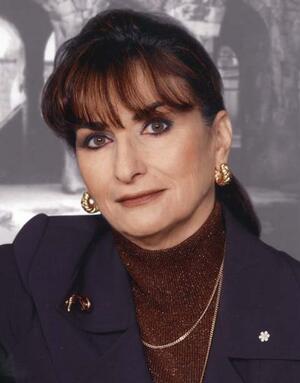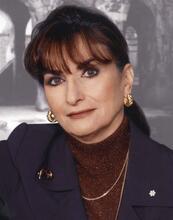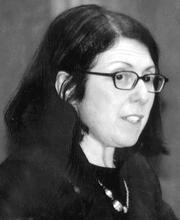Judy Feld Carr
"Judy Feld Carr... arose when it was ‘still night’ and woke up the world to the plight of our brethren in Syria," announced the leaders of the Syrian-Jewish community in honoring the Canadian woman who single-handedly engineered the escape of more than 3,500 Jews from persecution in their homeland.
Institution: Judy Feld Carr.
Raised in Sudbury, Ontario, Judy Feld Carr did her Music Education training at the University of Toronto. There, she met and married Dr Ronald Feld, a Jewish activist like herself. They were both drawn to the plight of Syrian Jewry. In 1973 Dr Feld died suddenly. Prior to his death, a first contact had been made with Rabbi Hamra in Damascus. Despite being a working single parent with three young children, Judy continued to exchange coded messages with Rabbi Hamra, and cautiously set in place underground network inside Syria. For almost 30 years Judy rescued Jews out of Syria. By the time her last family landed safely in New York on September 11, 2001, she had redeemed and/or helped 3,228 Syrian Jews to escape.
“Whoever saves a life of Israel, it is considered as if he saved an entire world” (Babylonian Talmud: Sanhedrin 37a).
For almost 30 years (1973-2001), Judy Feld Carr dedicated herself to the Syrian Jewish community, plotting the rescue of 3,228 Syrian Jews.
Family & Education
Born in Montreal, Quebec, on December 26, 1938, Judy and her younger brother Alexander (1942–1999) were raised in the mining town of Sudbury in northern Ontario. Here, Judy’s Russian-born father, Jack Leve (1898–1983), was a fur trader and leader of Sudbury’s tiny Jewish community. Judy’s mother, Sarah (née Rives, b. Brooklyn 1917, d. 1986), managed the family home. When Judy left Sudbury for Toronto, to pursue her studies in music education at the University of Toronto, Judy recollected her father saying: “I’ve taught you to be a good Jew.” Judy took his words to heart and identified strongly with Jewish issues.
Judy earned a Bachelor of Music Education, and a combined Masters degree in Music Education and Musicology (Mus.M) from the Faculty of Music. She also received a diploma to teach Instrumental and Vocal Music in Ontario’s Secondary School System through the university’s Ontario College of Education. In 1960, she married Dr. Ronald (Rubin) Feld (1933-1973), a young physician.
Early Work with Syrian Jewry
A chance reading of a Jerusalem Post article in 1972 persuaded Judy and Rubin that something needed to be done for the Jews of Syria. The couple organized a Syrian Jewish support committee to publicize the precarious existence of Syrian Jewry. With Israel's victory over Syria and its allies in the 1967 war, Syria's small Jewish community was subjected to arbitrary violence as well as economic and travel and restrictions. As Syrian Jews had no recourse to the police or courts, confiscation of property, unwarranted arrests, torture, assaults, and looting were not infrequent occurrences. Despite the Syrian government’s loathing of its Jewish population emigration was denied for fear those leaving would move to Israel; when a family member did manage to escape, the consequences for the family left behind were brutal. The Canadian committee made efforts to contact a Jewish community representative in Damascus. Finally, the committee connected with Rabbi Ibrahim Hamra in Damascus and sent a telegram asking him what religious books were needed. He responded with a list, the first of many telegrams between Damascus and Toronto.
In the first package of books sent, Judy wrote on the inside cover of all the books, “Best wishes to the Jewish community in Damascus, Syria, from the Jewish community in Toronto, Canada.” After the books were boxed up, she laid a US$50 bill on top and mailed it to the rabbi. Judy hoped that “if they [the Syrian officials] opened the box, they’d see the bill, keep it and give the books to the rabbi.” Along with the packages, a guarded and coded message system began between Rabbi Hamra and Judy based on references to religious texts. Several years later she was approached to develop a similar communication system with Jews in Aleppo and Quamishli. These were the only towns in Syria where Jews were permitted to live. When Dr. Feld died suddenly, Judy was 33 years old. Even as she was adjusting to her role as a working single parent of three young children, the telegrams continued to arrive from the Syrian Jewish community. “What could I do; I had to respond,” she recalled.
To honour Dr. Feld’s memory, the Board of Governors of Beth Tzedec, the largest Conservative synagogue in North America, to which the Felds belonged, founded the Dr. Ronald Feld Fund for Jews in Arab Lands to support the Syrian work. The fund was supported through donations from across Canada and the United States.
Early in 1977, Judy married prominent Toronto lawyer and Jewish leader Donald Carr (b. 1928). Now she was both working and running a home with a blended family: her three children, Alan (b. 1961), Gary (b. 1965), and Elizabeth (b. 1969), and Donald’s three children, Aaron (b.1956), Jonathan (b.1959) and Adam (b. 1965). Judy worked as a musicologist teaching instrumental and vocal music in both Toronto secondary schools and universities, as well as being a visiting lecturer.
She was also maintaining her connections with Syria. She gave up her teaching and lecturing, and her work with the Syrian Jewish community became her second “life.” However, she did not cease her other volunteer work. In 1982, Toronto’s Beth Tzedec elected Judy as its first female president. During this time, she was also the Chair of the National Committee for Jews in Arab Lands of Canadian Jewish Congress (CJC), which gave her access to government ministers and community leaders.
Bringing Jews Out of Syria
When asked to bring a rabbi out of Syria to Toronto for cancer treatment, Judy was intrigued by the possibility of removing a Jew from Syria. She quickly learned that with enough money it was possible to buy Jews out of Syria. Money quietly raised in Toronto for bribes and airline tickets enabled Judy to eventually buy the rabbi out of Syria.
Judy worked with members of her secret underground network, who negotiated with Syrian officials, at all levels of the Syrian judicial system, for the removal of more and more Jews. When all other avenues of escape had closed, and the family had exhausted every possibility to leave Syria, Judy’s name would come up, and a member or representative of the family would contact her. Each case was unique. Since Syrians would rarely permit an entire family to leave together, Judy found herself bargaining for each family member in turn. With each new name she began the long and sometimes cumbersome rescue process. There were times when it was imperative to quickly remove an individual or even an entire family in trouble with the Syrian authorities. When bribes would not work, it became necessary “to pay off people on the escape route and negotiate prices." By the time she was actively abetting the removal of Syrian Jews, her “underground network” inside Syria enabled her to receive secret information and to find smugglers she could trust. At great cost and personal risk, she paid smugglers to guide individuals and families across the heavily guarded Syrian border with Turkey. Once in Turkey, many of those smuggled out were quietly moved on to Israel.
For those who were ransomed, Syrian officials wanted an excuse for permitting these Jews to leave. Judy was inventive, pleading medical treatment, caretaking responsibilities for the sick, business concerns, higher education, or even visiting family not seen since 1948, when Jewish exit from Syria was prohibited. Besides the ransom, each Jew leaving had to purchase return tickets and post funds to guarantee his or her return to Syria even though they, and the Syrian authorities who took these bribes, knew they were not returning. Those whom she bought out of Syria settled in Israel, Brooklyn, New York, and South America.
In the early 1990s, an American-brokered peace between Israel and Syria seemed possible. In order to demonstrate their willingness to engage in bilateral talks, Syria officially lifted most barriers to Jewish departures. However, officials responsible for issuing passports and exit visas still demanded a handsome fee for their services. Unsure that the Syrian door would remain open, Judy threw all her energy and financial resources into removing the remaining Jews from Syria as quickly as possible. Most left. The last family to leave arrived in the United States, September 11, 2001.
As well as rescuing several thousand Syrian Jews, Judy rescued many rare religious books from Syria. It was most rewarding for her to rescue the Damascus Keter. a beautifully handwritten Tanakh (Hebrew Bible) from the 12th century. Documentation shows that the Keter, believed to be of Italian origin, was purchased in Castille, Spain, in the 15th century, and again in the early 16th century in Constantinople. By the 20th century, it was in Damascus. In the early 1990s, smuggled out in the coat of a Catholic friend visiting Damascus, it found its way to Toronto, and finally to Jerusalem, where it now rests in the National Jewish Library. The full story of "how it happened" and "who made it possible in Syria" remains untold.
Awards and Recognition
Documentary about Judy Feld Carr
For over 20 years, Judy Feld Carr lived a double life where she had to make “terrible and difficult decisions in dealing with individual lives.” While her rescue work finished in 2001, and the Feld Fund closed in 2003, she did not return to musicology (she had not been active in the field for almost thirty years). Aspects of her rescue work did not end in 2003.The knowledge she gained through her work – of the Syrian underground network, of how to move funds into Syria, and who could be trusted – was valuable and needed to be shared. In the aftermath, she was questioned a great deal and was often asked to provide affirmation and/or corroborating information for reports received by various intelligence agencies about Syria. She was involved in sharing such information until April 2019.
Judy Feld Carr receiving Israel's Presidential Medal of Honor
With those rescued now safe, Judy was finally able to share a part of "the best kept secret in the Jewish world." She spoke to audiences in major Jewish communities throughout Canada and the United States, as well as in Israel, South Africa, Panama, Brazil, and Mexico. In her talks, she describes the threats on her life and family (the Syrians considered her a spy), her fears of making a mistake, and the unremitting stress with which she lived. She was honored in 1995 by Israeli Prime Minister Yizhak Rabin. “Words cannot express my gratitude to you for 23 years of hard and dangerous work,” wrote Rabin. Besides honorary degrees and accolades from Jewish and Israeli government and security organizations, she was awarded the Order of Canada, the highest award Canada can give a citizen, in 2001. In June 2012, President Shimon Peres presented Judy with The Presidential Award of Distinction of the State of Israel. Created by Peres, the award was established to "recognize outstanding contribution to the Jewish People and the State of Israel'. Judy was one of the first six recipients. In 2013, The Algemeiner's “Jewish 100” list recognized Judy for her work in rescuing Syrian Jews. Perhaps most important to her was an honor bestowed by Syrian Jewish leaders who proclaimed, “Judy Feld Carr has saved entire worlds and will be blessed by generations to come.”
Awards and Honors
1993:
Ben Gurion Negev Award
1995:
Saul Hayes Human Rights Award, Canadian Jewish Congress
Honorary Award, United Association of Israelis of Syrian Origin, Israel
1996:
Humanitarian Award of Merit, University of Haifa
2000:
Doctor of Laws honoris causa, Laurentian University, Sudbury, Ontario
2001:
Medal of Valor, Simon Wiesenthal Centre, Los Angeles (five-time honoree)
Member of the Order of Canada, Ottawa
2002:
Abraham Sachar Medal, Woman of the Year, Brandeis University
Doctor of Humane Letters honoris causa, Jewish Theological Seminary, New York
Queen Elizabeth II Golden Jubilee Medal
Award for Tolerance, Justice and Human Rights, Simon Wiesenthal Centre, Toronto
2009:
Dr Jane Evans Pursuit of Justice Award of Women of Reform Judaism of North America
2011:
Human Rights Award (with husband, Donald Carr), The Canadian Centre for Diversity, Toronto
2012:
The Presidential Award of Distinction of the State of Israel, Jerusalem
Queen Elizabeth II Diamond Jubilee Medal
Bibliography
Troper, Harold Martin. The Rescuer: The Amazing True Story of How One Woman Helped Save the Jews of Syria. Toronto, ON: Lester, Mason & Begg Limited. 2007.
Ahren, Raphael. “Thank God, there are almost no Jews in Syria now.” The Times of Israel. August 17, 2012.
Carr, Judy Feld. “The Miraculous Rescue of Jews from Syria.” Canadian Jewish News. December 13, 2017.
Humphreys, Adrian. “Judy Feld Carr, a Toronto mother turned spy, helped 3,228 Jews escape anti-Semitic regime in Syria.” National Post. September 20, 2013.
Linde, Steve. “Judy Feld Carr Secretly Rescued Syrian Jews.” The Jerusalem Post. June 18, 2012.





